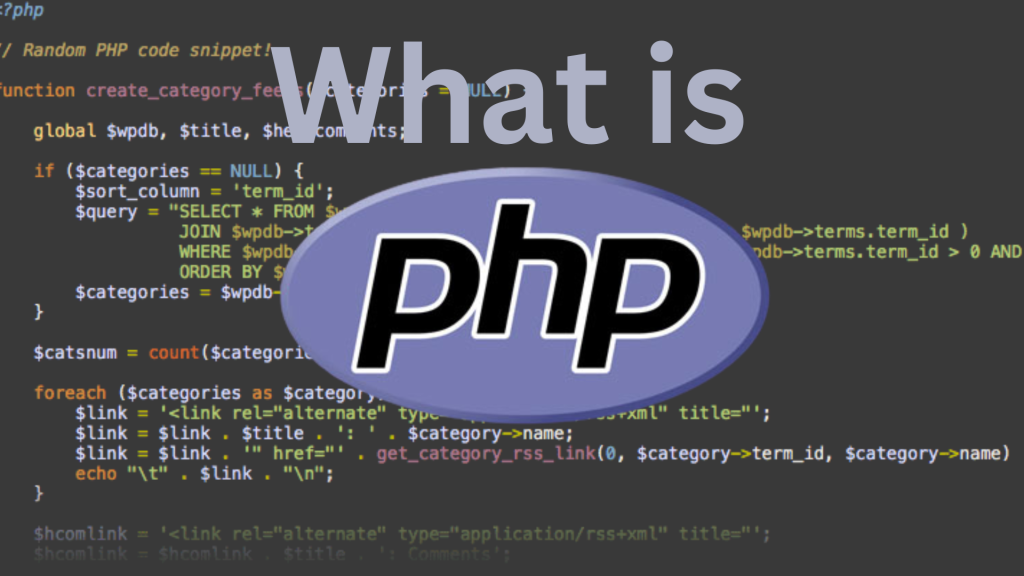Why PHP Is So Famous For Web Development
Discover why PHP is a leading choice for web development in the vast expanse of the internet. PHP stands out among many options due to its simplicity, versatility, and scalability. Despite newer technologies emerging, PHP remains strong and powers numerous websites worldwide. Its user-friendly nature and ability to handle diverse tasks have made it a favorite among developers. From its humble beginnings to being embraced by tech giants like Facebook and WordPress, PHP has transformed web development. This article delves into why PHP is so famous for web development, covering its key features, strong community support, and impact on the digital landscape.
Let’s unravel why PHP continues to be the preferred language for creating exceptional websites.”
What is PHP
PHP, short for Hypertext Preprocessor, is a free and open-source server-side language used by a large community. It focuses on managing the backend of websites and web applications, which means handling tasks like processing data, managing user sessions, and interacting with databases. This makes PHP a crucial tool in web development, as it ensures that websites and apps function smoothly behind the scenes.

Since its creation in the mid-1990s, PHP has become incredibly popular, powering many websites and apps. It’s known for being easy to use and versatile, seamlessly working with HTML to create dynamic web experiences. With ongoing support from its community, PHP continues to evolve, providing developers with tools to build all kinds of web projects. Whether it’s a simple personal site or a complex business application, PHP is a vital tool for bringing ideas to life online.
Overview Of PHP’s Prominence in Web Development
Understanding the significance of selecting the appropriate programming language is paramount in the dynamic world of web development. PHP, commonly known as Hypertext Preprocessor, emerges as a central figure in this landscape. With a brief exploration of its origins and widespread adoption, PHP stands as a stalwart in the realm of web development, offering developers a versatile toolset to craft robust digital solutions.
PHP traces its roots back to the mid-1990s when it was initially developed as a simple set of Common Gateway Interface (CGI) binaries written in C language by Danish-Canadian programmer Rasmus Lerdorf. Originally intended for managing his personal website’s traffic and tracking visitors, PHP evolved into a server-side scripting language capable of generating dynamic web pages. Over the years, PHP has undergone significant transformations and iterations, thanks to the contributions of a vast and dedicated community of developers worldwide.
Today, PHP boasts widespread adoption across the internet, powering a plethora of websites ranging from small personal blogs to large-scale enterprise applications. Its popularity can be attributed to several factors, including its user-friendly syntax, seamless integration with HTML, and extensive documentation. Unlike other programming languages that may require steep learning curves, PHP’s straightforward syntax makes it accessible even to those with limited programming experience. This accessibility has contributed to its widespread adoption and continued relevance in the ever-expanding digital landscape.
Furthermore, PHP’s versatility is another key aspect of its prominence in web development. It can be used for a wide range of tasks, including generating dynamic content, interacting with databases, handling form data, and managing session variables. Whether developers are creating simple contact forms or complex e-commerce platforms, PHP provides the necessary tools and functionalities to bring their ideas to life.
Additionally, PHP’s open-source nature has played a pivotal role in its success and widespread adoption. Being open-source means that the source code is freely available for anyone to use, modify, and distribute. This fosters collaboration among developers, leading to continuous improvements, bug fixes, and the development of new features. The vibrant PHP community actively contributes to its evolution, ensuring that it remains relevant and competitive in a rapidly changing technological landscape.
So, PHP’s prominence in web development is undeniable, owing to its simplicity, versatility, widespread adoption, and vibrant community support. As businesses and developers navigate the complexities of the digital world, PHP stands as a reliable and indispensable tool for creating dynamic and interactive web experiences. By understanding the importance of selecting the right programming language, developers can leverage the power of PHP to build robust and scalable web solutions that meet the diverse needs of users and businesses alike.
Read More Article:
- Web Development Services [Best Company Recommended]
- Hire Web Developers [Hire the Best Web Developers in 48 Hours]
The Rise of PHP
The story of PHP’s ascent in the world of web development begins in the mid-90s when it emerged as a simple set of CGI (Common Gateway Interface) binaries created by programmer Rasmus Lerdorf. PHP’s journey from its humble beginnings to becoming a cornerstone of web development is marked by several key factors that have contributed to its widespread popularity.
One of the primary reasons behind PHP’s success is its user-friendly nature. Unlike some other programming languages that may have steep learning curves, PHP’s syntax is easy to understand and work with. This accessibility has made it a favorite among developers, particularly those who may be newer to programming or have limited technical experience.
Another factor driving PHP’s rise to prominence is its seamless integration with HTML, the language used to build web pages. PHP allows developers to embed dynamic content directly into HTML, making it easier to create websites with interactive features like forms, user authentication, and database interactions.
Moreover, PHP’s open-source nature has played a significant role in its popularity. Being open-source means that the source code is freely available for anyone to use, modify, and distribute. This has led to the formation of a vibrant and active community of developers who contribute to PHP’s ongoing development and improvement. As a result, PHP continues to
evolve with regular updates and enhancements, ensuring that it remains relevant and competitive in the ever-changing landscape of web development.
Today, PHP powers some of the most prominent websites on the internet, including social media behemoth Facebook and the popular content management system WordPress. These examples serve as a testament to PHP’s capabilities and its enduring relevance in the digital age.
In summary, PHP’s journey from its inception in the mid-90s to its current status as a dominant force in web development is marked by its simplicity, versatility, and widespread adoption. With its easy-to-understand syntax, seamless integration with HTML, and active community support, PHP continues to empower developers to create dynamic and interactive web experiences that shape the online world we live in.
Why is PHP So Powerful?
PHP is the perfect language for building websites and web applications, and there are a few key reasons why it’s so well-suited for this task. First off, PHP is specifically designed for web development tasks, so it comes with all the features and tools developers need to create dynamic and interactive websites. It’s like having a toolbox filled with everything you need to build a house – but for websites! Plus, PHP works seamlessly with other web technologies and platforms, making it easy to integrate and work with databases, process user input, and generate dynamic content. And because PHP is so widely used, there’s a huge community of developers who are constantly sharing tips, resources, and support to help each other out. So whether you’re a beginner just getting started or an experienced developer looking to build something big, PHP has got you covered!
Key Features of PHP
PHP boasts key features that make it a preferred choice for web development projects worldwide. Its simplicity shines through in its user-friendly syntax, making it easy for developers to write and understand code quickly. Whether you’re a seasoned pro or just starting out, PHP’s straightforward nature ensures a smooth learning curve, allowing developers to focus more on building great web applications.
Versatility is another standout feature of PHP, as it can be used for a wide range of web projects. From simple personal websites to complex e-commerce platforms and enterprise-level applications, PHP adapts effortlessly to diverse development needs. Its extensive library of frameworks and libraries further enhances its versatility, providing developers with the tools they need to tackle any project with ease.
When it comes to scalability, PHP shines yet again. With its ability to handle projects of different sizes and complexities, PHP offers developers the flexibility to start small and expand seamlessly as their projects grow. Whether it’s a small blog gaining traction or a multinational corporation launching a new online platform, PHP’s scalability ensures that web applications can grow alongside their user base without compromising performance or stability.
Why Php Is So Famous For Web Development
PHP is a free and open-source language that’s been around for over 20 years and it’s still super popular for making websites and web apps. In this blog, we’re going to chat about why PHP is such a big deal in web development. First off, it’s really easy to use, especially for beginners. Plus, it can handle all sorts of projects, whether they’re small or massive. And guess what? PHP powers a whopping 80% of websites online! So stick around to find out why PHP is so famous for building cool stuff on the web.
Free and Open-source
PHP is awesome because it’s free and open-source, meaning anyone can use it without paying. This makes it super accessible for folks who want to build websites or apps. Plus, there’s a big community of developers who work together to make PHP better and share tips. With PHP, you can create all sorts of cool stuff for the web, like websites, online stores, and more, without spending a dime. And the best part? There are lots of handy tools and resources available, making it easy for even beginners to get started. So, if you’re looking for a budget-friendly and user-friendly option for web development, PHP has got you covered.
Easy to learn
PHP is super easy to learn and use, especially if you’re just starting out in web development. It’s kind of like other programming languages you might have heard of, so if you know a bit about those, you’ll feel right at home with PHP. Plus, there are tons of helpful resources online, like blogs, tutorials, and courses, that can walk you through everything you need to know. With PHP, you can build websites and apps without worrying about complicated stuff like memory management or strict typing. And if you ever get stuck, don’t worry—the PHP community is huge and always ready to lend a hand.
High Speed
PHP is known for its high-speed performance, thanks to its efficient use of memory. This not only benefits developers by reducing workload and loading times but also delights clients who receive their projects sooner. Speedy uploads are also essential for SEO, ensuring your website ranks well and attracts more visitors for marketing and sales purposes.
Scalable
When it comes to scalability, PHP shines as a top choice for building websites and web applications. Founders envision their projects growing over time, and PHP offers the flexibility to accommodate this growth effortlessly. With PHP, scaling up is a breeze – simply add more servers as needed, allowing the website to handle increasing traffic without sacrificing performance. Whether it’s a small startup website or a large-scale enterprise application, PHP’s scalability ensures that your project can expand seamlessly to meet the demands of your growing user base.
Platform independent
PHP stands out as a platform-independent language, offering developers the freedom to work across various operating systems such as Windows, Unix, Linux, and macOS. This versatility ensures that PHP-based web applications can seamlessly run on any platform without the need for redevelopment. With PHP, developers can save valuable time and resources, as integration with other programming languages and databases is a breeze. Whether you’re coding on a Windows machine or a macOS device, PHP empowers developers to create and deploy applications with ease, making it a preferred choice for building versatile and accessible web solutions.
Lots of Resources
PHP offers a wealth of resources for developers, making it easy to integrate custom features into web applications. From dependency managers and frameworks to documentation and editors, there are plenty of ready-to-use tools available. Online resources abound, making it simple for any developer to learn PHP and discover new ways to build web solutions. With tons of extensions available, developers can easily enhance PHP’s capabilities to meet their project needs.
Security
Security is a top priority in web development, and PHP stands out for its robust security features and proactive approach to addressing vulnerabilities. Developers prioritize security best practices when building PHP applications, ensuring protection against common threats like SQL injection and cross-site scripting (XSS). Moreover, PHP benefits from a large and vigilant community of developers who continuously evaluate the language for vulnerabilities and promptly develop fixes and updates to enhance security. With built-in security features and ongoing updates, PHP remains a secure and reliable choice for developing web applications that prioritize data protection and user privacy.
Performance & Stability
For the past 25 years, PHP has been a cornerstone of web development, playing a vital role in creating major platforms like Wikipedia and Facebook. Its reliability and versatility have made it the go-to choice for powering some of the internet’s biggest names. When it comes to hosting platforms like MediaWiki, PHP’s long-standing reputation makes it perfect for seamless integration and efficient performance.
Over the years, PHP has only gotten better, improving its stability and performance. It’s become even more adept at managing content and handling multiple user requests, ensuring a smooth and reliable experience for users and developers alike.
Cost-Efficient
PHP is super cost-efficient for web development. It’s open-source, meaning you don’t need any pricey software or licenses to use it. Plus, there are tons of free resources and frameworks that help speed up development without adding to the bill. Since PHP is free and doesn’t have any licensing fees, it’s a budget-friendly option for developers. And because it’s constantly improved by a global community, you can trust it to work well without needing a lot of time or effort to make it better. So if you’re looking to save money on your web projects, PHP is the way to go.
Best For Custom Development
PHP is the perfect choice for building custom websites because it offers developers the freedom to create exactly what their clients need. Unlike other options, PHP isn’t limited by any predefined choices, so developers can tailor-make websites to fit their clients’ requirements perfectly. By combining PHP with JavaScript, developers can create websites that not only work well but also look great. It’s like having a blank canvas where developers can paint any picture their clients envision.
Flexible
PHP is super flexible, giving developers the freedom to code in their own style without strict rules. You can choose the tools and frameworks that work best for you, without any limitations. Plus, PHP has a bunch of awesome frameworks like Laravel, Symfony, and CodeIgniter that make web development a breeze. These frameworks offer all kinds of helpful features like routing, templating, authentication, and testing, making it easier to build awesome applications in less time. So whether you’re a seasoned developer or just starting out, PHP’s flexibility and ecosystem of frameworks make it a top choice for web development.
Short time development
When it comes to website development, PHP gets the job done fast. Even complex projects are completed in no time with PHP, saving you a ton of money on website creation.
innovative
PHP is always evolving, and one of its shining stars is Laravel. Created in 2011 by Taylor Otwell, Laravel has become a game-changer in web development. It’s all about making PHP coding elegant and enjoyable, blending the best features of other frameworks with its own fresh ideas.
Laravel brings a bunch of cool stuff to the table. Take Artisan, for example – it’s like a magic wand for developers, letting them generate code, manage databases, run tests, and more, all from the command line. Then there’s Eloquent, a fancy tool for working with databases using simple, expressive language. And don’t forget about Blade, the templating engine that makes writing HTML with PHP a breeze.
But Laravel’s not done yet. It’s got a whole family of tools and services, from Homestead and Valet for setting up development environments, to Forge and Envoyer for deploying applications with ease. Plus, there’s Spark for creating software as a service (SaaS) apps, Nova for managing applications, and Vapor for deploying apps using serverless tech.
And the best part? Laravel’s not just changing PHP – it’s inspiring other frameworks and projects in the PHP community and beyond. It’s like a superhero leading the charge for a new era of web development.
Advantages of PHP in Web Development
PHP offers numerous advantages for web development, making it a popular choice among developers of all skill levels. One of the key advantages is the strong community support that PHP enjoys. This means that there are countless developers around the world who use PHP and are willing to help others learn and troubleshoot problems. Whether you’re a beginner or an experienced developer, you can find a wealth of resources, tutorials, and forums where you can get assistance and advice. This robust community ensures that PHP remains well-maintained and up-to-date with the latest trends and best practices in web development.
Another major advantage of PHP is its compatibility with a wide range of databases, servers, and operating systems. This compatibility allows developers to use PHP with popular databases like MySQL, PostgreSQL, SQLite, and MongoDB, making it easy to store and retrieve data for web applications. Additionally, PHP works seamlessly with web servers such as Apache and Nginx and operating systems like Linux, Windows, and macOS. This flexibility means developers can build and deploy PHP applications on virtually any platform, without worrying about compatibility issues.
Moreover, PHP boasts impressive performance metrics, making it an ideal choice for high-performance web applications. Thanks to its efficient execution and optimized runtime environment, PHP delivers exceptional speed and responsiveness, enhancing the overall user experience. Whether handling simple tasks or processing complex operations, PHP excels in providing fast and reliable performance, ensuring that web applications run smoothly and efficiently.
In a nutshell, PHP offers numerous advantages for web development, including strong community support, compatibility with various databases and servers, and ease of use. Whether you’re building a small personal website or a large-scale enterprise application, PHP provides the tools and resources you need to bring your ideas to life on the web. With its widespread adoption and continuous evolution, PHP remains a top choice for developers looking to create dynamic and interactive websites and applications.
Future Outlook
When we talk about the future of PHP, it’s like stepping into a conversation about how websites are going to be built in the coming years. You see, in the big world of creating stuff for the web, things are always changing. But PHP? It’s like that reliable friend who’s been there through thick and thin, adapting to new trends while staying true to its roots.
Let’s break it down. First off, people are always chatting about how web development is evolving. New tools, new ways of doing things—it’s a never-ending story. But amidst all this change, PHP stands tall. It’s like the Swiss Army knife of web development languages. It can do a lot of different things, and it’s been doing them well for a long time.
Now, onto predictions. Picture this: experts gazing into their crystal balls and saying, “Yep, PHP’s still gonna be a big deal.” How come? Well, for starters, PHP isn’t stuck in the past. It’s always evolving, like a chameleon blending into new surroundings. Cloud computing, artificial intelligence, you name it—PHP can roll with the punches and stay relevant.
Lastly, let’s talk about where PHP is headed. Think of it like a garden full of blooming ideas. Developers are tending to it, nurturing new ways to make PHP even better. Maybe it’s finding ways to make websites load faster or making it easier for developers to work their magic. And hey, there’s no shortage of creativity here. From refining the nuts and bolts of PHP to embracing shiny new technologies, the PHP community is like a bunch of pioneers, charting new territories in the wild west of the web.
So, in a nutshell, the future of PHP looks bright. It’s like a reliable old friend who’s not afraid to learn some new tricks. And with developers leading the charge, who knows what amazing things they’ll come up with next?
Frequently Asked Questions
Q1: What makes PHP stand out for web development?
A1: PHP is renowned for its simplicity, versatility, and scalability, making it a top choice for building dynamic websites and web applications.
Q2: Is PHP difficult to learn for beginners?
A2: Not at all! PHP’s syntax is easy to understand, especially for those with prior experience in programming. Plus, there are plenty of resources available online to help beginners get started.
Q3: Can PHP handle different types of web projects?
A3: Absolutely! PHP is incredibly versatile and can be used for a wide range of projects, from simple personal websites to complex e-commerce platforms and enterprise-level applications.
Q4: Why is PHP so popular among developers?
A4: PHP’s popularity stems from its open-source nature, extensive community support, and vast ecosystem of frameworks and libraries, which streamline the development process and empower developers to create innovative solutions.
Q5: Does PHP support scalability for growing web projects?
A5: Yes, indeed! PHP’s scalability ensures that websites and applications can grow alongside their user base without compromising performance or stability, making it an ideal choice for projects of all sizes.
Q6: Is PHP still relevant in modern web development?
A6: Absolutely! PHP continues to evolve with the latest trends in web development, ensuring its continued relevance and adaptability in the ever-changing digital landscape.
Q7: Can I find PHP developers easily for my project?
A7: With PHP being one of the most popular programming languages, you can easily find skilled developers to bring your web projects to life. The large and active PHP community ensures that help and resources are readily available.
Final Thought
In simple terms, PHP is super famous for web development because it’s like a Swiss Army knife—it can do many different things well! Plus, there’s a huge community of people who support it and keep making it better. Whether building a basic website, setting up an online store, or creating a fancy web app, PHP’s got your back. And the best part? It’s free and easy to learn! So, if you need to make something cool on the web, PHP is worth checking out.






